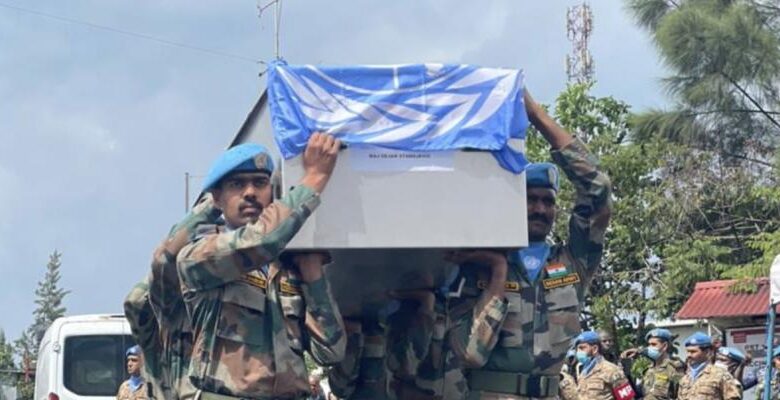400 UN Soldiers, Staff Killed In DR Congo In 20 Years
According to the UN, between 1999 and 2010, 161 Blue Helmets were killed in Democratic Republic of Congo; between 2010 and Feb. 28, 2022, 234 Blue Helmets met their deaths in the country.

At least 400 United Nations soldiers and civilians on missions in the Democratic Republic of Congo have been killed while on peacekeeping duties since 1999, a UN official revealed on Wednesday, April 20.
“We are in a dangerous environment. There have been about 400 personnel of the United Nations Organisation Stabilisation Mission in DR Congo (MONUSCO) who have lost their lives in service here in the DR Congo,” said Mathias Gillmann, spokesperson of MONUSCO in Kinshasa, the DR Congo capital.
According to the UN, between 1999 and 2010, 161 Blue Helmets were killed in DR Congo, while between 2010 and Feb. 28, 2022, 234 Blue Helmets met their deaths in the country.
“These figures include soldiers, police, civilians, as well as international experts, notably those who were assassinated in Kasai in 2017,” Gillmann explained.
“MONUSCO is one of the missions where the blood of Blue Helmets has flowed the most. We again recently lost a Blue Helmet during clashes with members of the Cooperative for the Development of Congo (CODECO) armed group in Ituri and eight others were lost in a helicopter crash about three weeks ago.”
The eight UN soldiers —including six Pakistanis, one Russian and one Serb— died on March 29, 2022 when their helicopter on a reconnaissance mission in a war zone pitching soldiers of the DR Congo national army, FARDC and M23 rebels crashed.
Authorities are yet to make the results of an investigation into the cause of the crash public.
“The Blue Helmets are sometimes targeted: armed groups attack them directly and discreetly attack United Nations bases,” explained the UN spokesperson, affirming that the UN soldiers are sometimes “in direct contact with the armed groups during combat.”
Present in the DR Congo since 1999, the United Nations Mission in Congo which became MONUSCO following the change in the nature of its mandate in 2010, is considered one of the most important and most expensive missions of the United Nations Organisation (UNO) in the world with an annual budget of one billion US dollars.
In 2015, MONUSCO had 19,815 Blue Helmets within its ranks. By a UN Security Council resolution of Dec. 2021, the number of Blue Helmets was reduced to 14,000 peacekeeping soldiers to combat the over 100 armed groups that have been destabilising the DR Congo for the past three decades.
Support Our Journalism
There are millions of ordinary people affected by conflict in Africa whose stories are missing in the mainstream media. HumAngle is determined to tell those challenging and under-reported stories, hoping that the people impacted by these conflicts will find the safety and security they deserve.
To ensure that we continue to provide public service coverage, we have a small favour to ask you. We want you to be part of our journalistic endeavour by contributing a token to us.
Your donation will further promote a robust, free, and independent media.
Donate HereStay Closer To The Stories That Matter




